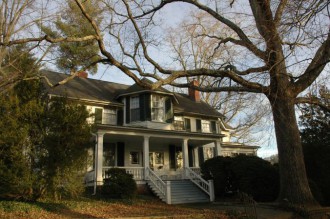“I know that Mayor Manheimer misses being here at this moment,” said Vice Mayor Marc Hunt as he presided over City Council’s victory lap celebrating the upgrade of the city’s credit rating to AAA. Consultant Doug Carter of DEC Associates presented a glowing account of Asheville’s recent financial management accomplishments, which culminated in Standard & Poor’s decision to elevate Asheville to the highest possible financial rating.
Of the handful of cities in North Carolina which have earned AAA ratings, only Asheville was designated “very strong” in all six of the management categories under the city’s control.
The triple-A rating allows Asheville to borrow money at the lowest interest rates available in the market, to access the greatest variety of lenders and to enjoy flexibility in the ways it can structure its debt. A credit rating, said Carter, is “hard to get and hard to lose,” meaning that Asheville can count on at least two years at the top of the ratings heap.
Both Carter and Hunt praised city management staff for paving the way for the AAA rating through effective financial planning and management practices.
HazMat team places first
Another city achievement recognized by Council was the recent first-place finish of the Asheville Fire Department’s hazardous materials team at the 12th annual HazMat Challenge. Eleven teams from across North Carolina participated. City Manager Gary Jackson praised the team, saying, “We have people with the ability to respond when something happens. Not if, but when … a tanker rolls over on the highway or we have a release of particulate matter or gases.”
Land Use Incentive Program revised
Jeff Staudinger, Assistant Director of Community & Economic Development, presented revisions to the city’s Land Use Incentive Program (LUIP).
The LUIP aims to encourage the development of affordable housing by providing projects which meet the program’s criteria with reductions in city fees and taxes. To be eligible for consideration, a project must consist of three or more rental units; include at least 10 percent of its units as affordable housing for families earning less than 80 percent of the annual median income; be located in the city of Asheville; be affordable to and leased to income-eligible households for at least 15 years; and allow convenient access to jobs, schools and services.
The city awards developers points based on factors such as the number of affordable units in a project, the length of time the units will remain affordable, the efficiency of the project location and others. The more points a development earns, the greater the reduction in city taxes and fees.
Councilwoman Gwen Wisler asked Staudinger what would happen if a developer failed to carry through on the commitments made to receive the grants. Staudinger and City Attorney Robin Currin clarified that enforcement mechanisms will be built into the grants, and that projects will be reviewed annually for compliance.
Councilman Smith pointed out that the LUIP represents “one arrow in the quiver of how we are approaching this problem of affordability” by creating predictability for builders. With well-honed guidelines in place, developers will be able to undertake affordable projects with confidence, knowing that future political changes will not endanger the grants on which they have based their project financial planning models. Smith said the changes in the LUIP “recognize that land cost is one of the biggest limiting factors in promoting affordability.” By allowing more flexibility in how the city evaluates the efficiency of a project’s location, the revisions may allow more projects to participate in the program.
Council approved the revised LUIP guidelines unanimously.
Living wage extended
Citing worries that extending the living wage to hourly and seasonal city employees could result in a reduction in hours for those workers, Councilman Jan Davis prompted discussion of the measure that would give raises to the city’s lowest-paid employees.
Hunt pointed out that the city budget, which went into effect on July 1, included $250,000 to cover the cost of extending the living wage rate to all workers.
Davis, however, expressed concern that managers of city departments, such as the Civic Center, may need to reduce hours or days of operation to offset the cost of the increased wages. City Manager Jackson agreed that higher costs over the course of the year will trigger departmental reviews to assess business practices.
“My concern with this is we’re going to be scaling back hours, cutting hours. … I’m going to vote against it,” said Davis, who clarified that he is philosophically in favor of all workers earning a living wage.
For his part, Councilman Cecil Bothwell would like to “make it $15 — just saying.”
On the living wage question, council voted 5-1 in favor of the measure, with Davis opposed.
The other consent agenda items were approved unanimously.
Legislative update
Buncombe County emerged from the state’s protracted budget process with its sales tax revenue unscathed. Earlier in the budget negotiations, a sales tax redistribution proposal that could have resulted in a loss of over $5 million in revenue to the county had been put forward.
A new state sales tax on installation and maintenance services passed as part of the budget, but it appears that the impact of this tax will be neutral for Buncombe County (though not for consumers, for whom the tax represents an increase).
Bothwell said a legislator reported to him that passing the budget required a number of side deals to be struck. In the ten days remaining in the legislative session, Bothwell noted, we might see “a flurry of bills” resulting from these deals. “It’s not over yet,” he warned.
Smith pointed out that $10 million had been cut from the mental health budget. Along with those cuts, Smith also regrets reductions in child care support and unearned income tax credits. He cautioned that the threat of Medicaid privatization remains in the state.
Zoning changes
Attorney Jim Siemens applied for zoning changes for a planned adaptive reuse of the 1869 Patton-Parker House at 95 Charlotte Street as a law office. Siemens also wants to build a new, two-unit housing structure behind the historic building.

As a local historic landmark, the Victorian-era house on 1.23 acres of property is protected against demolition for a year following a sale. However, the Preservation Society of Asheville-Buncombe County (PSABC), which has been marketing the house for the Parker family, will add private deed restrictions as part of the property’s transfer. PSABC director Jack Thompson commented that these restrictions will add a higher level of protection to the house and grounds.
Richard Liston asked what the project’s impact on traffic will be. City Planner Jessica Bernstein responded that the impact is anticipated to be minimal. The driveway on Charlotte Street will be used as an ingress point only, and a circular drive will be added to allow all vehicles to exit onto East Chestnut Street. Liston also wanted to know if the site’s mature trees will be saved; landscape architect Mark Wilson replied they will, with one possible exception.
Council unanimously approved the zoning change from residential to office zoning.
Next, Givens Gerber Park requested permission to increase by 22 the number of senior housing units previously approved for its Gerber Park project in South Asheville. The project will create a total of 262 units of senior housing, of which 202 will be designated affordable units for those earning 60 percent or less of the annual median income (AMI) and 60 will be “workforce housing” for those earning 61-100% of AMI.
Bothwell, moving to approve the request, applauded Givens for stepping up to provide more affordable housing in the community. Smith seconded the motion, saying the project will provide people earning limited incomes “a really nice place to live.” The motion passed 6-0.
Tourism Development Authority candidates
City Council received applications from four qualified candidates for two open seats on the Tourism Development Authority (TDA): Gary Froeba, John Luckett, Himanshu Karvir and Dennis Hulsing. Interviews will be held in open public session at 3:45 p.m. on Tuesday, Oct. 13, prior to the regular meeting of council. Council members will vote to select the TDA members during its meeting.
Council adjourned to go into closed session for unspecified reasons at 6:48 p.m.



Jan Davis: Sometimes a little breath of fresh air.
Unfortunately, Jan Davis’ tenure is ending soon as he did not seek re election. His soft bit of taxpayer sensibilities will be missed, no doubt. AVL voters have a chance to bring BALANCE and DIVERSITY to the City Council by voting for Dee Williams, John
Miall, and Carl Mumpower, and all should avoid voting for more liberal progressives who bring higher taxes, higher govco salaries, and illogical ‘leadership’. AVL has clearly been stunted by decades of such NON leadership. WE deserve BETTER !